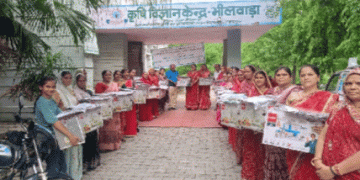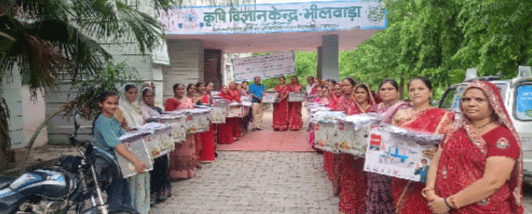In a significant step toward rural empowerment, a five-day training program on Entrepreneurship Development in Processing and Value Addition of Fruits and Vegetables was organized in Bhilwara, Rajasthan, from June 27, 2025. The initiative, led by ICAR-National Academy of Agricultural Research Management (NAARM), Hyderabad, in collaboration with Krishi Vigyan Kendra (KVK), Bhilwara, aimed to enhance self-employment opportunities for Scheduled Caste (SC) women under the Scheduled Caste Sub-Plan (SCSP).
Bridging the Gap in Agri-Processing Skills
The program trained 30 SC women farmers and youth in food processing techniques, enabling them to produce value-added products such as:
- Juices (Neem Giloy, beetroot, pineapple, mixed fruit)
- Snacks (banana chips, potato chips)
- Pickles (mango, lemon, green chilli, mushroom)
- Condiments (tomato ketchup, mango lonji)
- Sherbets (jamun, rose, mango-mint)
According to FAO (2024), nearly 40% of fruits and vegetables in India are lost post-harvest due to inadequate processing and storage facilities. By training rural women in value addition, this initiative helps reduce waste while increasing farm incomes.
Key Takeaways from Industry Experts
- Dr. Gopal Lal, Director, ICAR-NAARM, emphasized that value addition can boost farmer income by 30-50% while improving nutritional accessibility.
- Dr. J.S. Sandhu, former DDG, ICAR, highlighted the $600 billion global food processing market potential and stressed mechanization to cut labor costs.
- Dr. J.P. Mishra, Director, ICAR-ATARI, urged participants to form Self-Help Groups (SHGs) and connect with markets for better profitability.
- Dr. Lokesh Gupta, MPUAT, advocated for processing underutilized crops like papaya, custard apple, and garlic to enhance rural earnings.
Supporting Entrepreneurship with Tools and Training
To ensure practical implementation, participants received mixer grinders, slicers, travel bags, and certificates, equipping them to launch small-scale enterprises.
A Sustainable Model for Rural Growth
This training program underscores the huge untapped potential of agri-processing in rural India, particularly for marginalized women. By fostering entrepreneurship, reducing post-harvest losses, and linking farmers to markets, such initiatives can drive economic self-reliance and sustainable agriculture.































